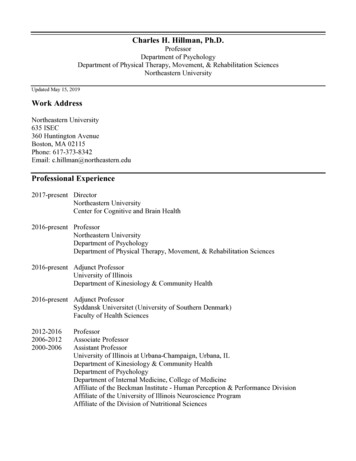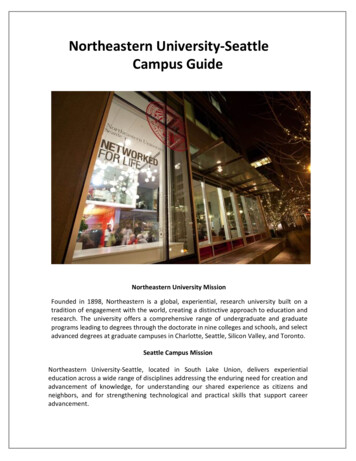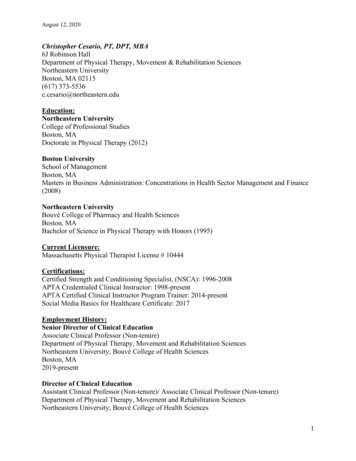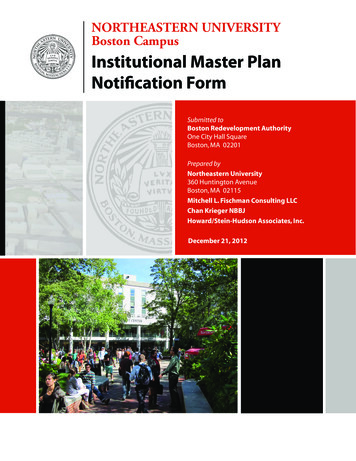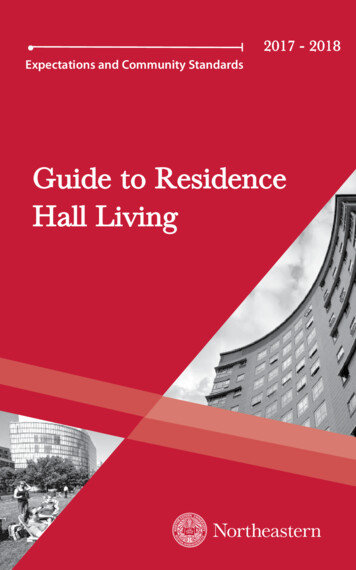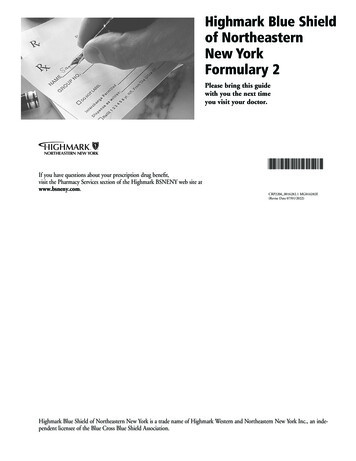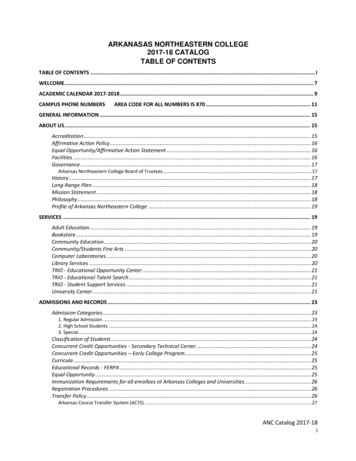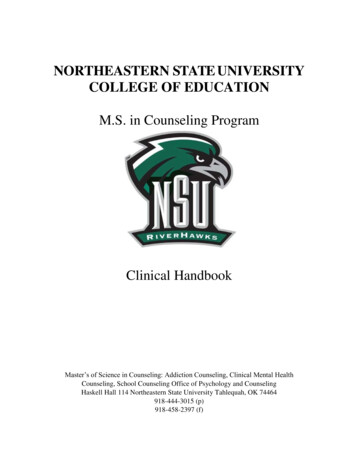
Transcription
NORTHEASTERN STATE UNIVERSITYCOLLEGE OF EDUCATIONM.S. in Counseling ProgramClinical HandbookMaster’s of Science in Counseling: Addiction Counseling, Clinical Mental HealthCounseling, School Counseling Office of Psychology and CounselingHaskell Hall 114 Northeastern State University Tahlequah, OK 74464918-444-3015 (p)918-458-2397 (f)
Table of ContentsIntroduction . 5Graduate Program Accreditation . 6Program Mission Statement . 6Program Goals . 7Program Objectives . 7Faculty. 7Administrative Staff Members . 7NSU Counseling Program – Clinical Expectations . 8Site Supervisor Qualifications . 9Site Supervisor Responsibilities . 9University Supervisor Responsibilities . 9Home Visits . 9Professionalism . 9Documentation . 10Confidentiality . 10Respect for Clients . 10Crisis Procedures . 11Background Checks & Criminal Records . 11Malpractice Insurance . 11Ethical and Legal Guidelines . 12Policy Regarding Suspected Client/Student Abuse . 12Site Supervisor Concerns Regarding CITs . 12CIT Concerns Regarding the Site Supervisor . 13CIT Concerns Regarding University Supervisors. 13Frequently Asked Questions . 14Concluding Comments. 15Practicum I (COUN 5603) . 17Practicum Agreement for Counselors-in-Training . 19Volunteer Client Request Form . 20Consent Form for Recording . 21Intake Form . 22Practicum I Log. 24Practicum II for CMHC/AC (COUN 5733/COUN 5673) . 25Return to Beginning of Document
NSU Practicum II/Internship Site Supervision Contract for CMHC/AC . 28Twelve Core Functions of the Alcohol and Other Drug Abuse Counselor . 30Appropriate Duties for Clinical Mental Health Counselors-in-Training . 31Consent Form for Recording . 32Midterm and Final Evaluation for Addiction Counseling CITs . 33Midterm and Final Evaluation for Clinical Mental Health Counseling CITs . 35CIT Experience Surveys . 36Survey 1: Student Perception of Learning . 36Survey 2: Advising Survey . 37Survey 3: Site and Supervision Evaluation . 37Practicum II for SC (COUN 5643) . 39NSU Practicum II/Internship Site Supervision Contract for SC . 41Appropriate and Inappropriate Duties for SC . 43School Counseling Consent and Taping Form . 44Consent Form for Recording . 45Midterm and Final Evaluation for School Counseling CITs . 46CIT Experience Surveys . 48Survey 1: Student Perception of Learning . 48Survey 2: Advising Survey . 49Survey 3: Site and Supervision Evaluation . 49Internship for CMHC/AC (COUN 5801-5806/COUN 5821-5826) . 51NSU Practicum II/Internship Site Supervision Contract for CMHC/AC . 53Twelve Core Functions of the Alcohol and Other Drug Abuse Counselor . 55Appropriate Duties for Clinical Mental Health Counselors-in-Training . 56Midterm and Final Evaluation for Addiction Counseling CITs . 57Midterm and Final Evaluation for Clinical Mental Health Counseling CITs . 59Exit Surveys for On-Site AC/CMHC Supervisors . 60Survey 1: Perception of Supervisee Competence . 60Survey 2: Perception of Employee Competence . 61CIT Experience Surveys . 62Survey 1: Student Perception of Learning . 62Survey 2: Advising Survey . 63Survey 3: Site and Supervision Evaluation . 63Internship for SC (COUN 5841-5846) . 65Return to Beginning of Document
NSU Practicum II/Internship Site Supervision Contract for SC . 68Appropriate and Inappropriate Duties for SC . 70School Counseling Consent and Taping Form . 71Consent Form for Recording . 72Midterm and Final Evaluation for School Counseling CITs . 73Exit Surveys for On-Site SC Supervisors . 75Survey 1: Perception of Supervisee Competence . 75Survey 2: Perception of Employee Competence . 76CIT Experience Surveys . 78Survey 1: Student Perception of Learning . 78Survey 2: Advising Survey . 79Survey 3: Site and Supervision Evaluation . 79Alumni Survey . 81Return to Beginning of Document
IntroductionWelcome and congratulations on your acceptance into the Northeastern State University (NSU)Psychology and Counseling Department graduate training program. Transitioning to graduatestudy and training to become a professional counselor is an exciting and unique opportunity.Graduate training is in every sense of the term a transition along a professional developmentalpath. It is also a demanding endeavor. The training faculty in Psychology and CounselingDepartment have developed this clinical handbook to assist you in your transition to the programand to provide you with a document that sets out guidelines for the graduate clinical trainingcomponent of the counseling program. If you familiarize yourself with this handbook, yourprogression through the clinical training will be more manageable.Although not designed to be a stand-alone guide (we encourage you to consult with facultythroughout your training), the clinical handbook provides the counselor-in-training (CIT) with a"map" to plan coursework and clinical experiences. Training to become a counselor regardless ofprogram emphasis (Clinical Mental Health Counseling, Addiction Counseling, or SchoolCounseling) involves dynamic processes that while grounded in course work, go beyondacademic performance. Adequate progression through professional counselor training is drivenby completion of coursework (in sequence), the appropriate evolution of professional identityand associated behaviors, as well as counseling competencies. These experiences depend uponmastery of material in coursework (theory, intervention, counseling relationship dynamics, etc.).Professional development as a counselor involves the application of knowledge, skill, and styleto training experiences.Faculty wish to emphasize at the outset that the culture of professional counselor training at NSUis a dynamic and challenging undertaking. Working and serving others as a substance abuse,school, or professional counselor is a rewarding and exciting career. It also is very muchdependent upon students' engagement and development as a professional counselor based ontheir training. The rigors and demands of training and development can be greatly facilitated byyour familiarizing yourself with this manual. You are encouraged to utilize this handbook toorient to the clinical experiences within the counseling program and to meet necessary CITresponsibilities towards successful and timely completion of course work and training events.We sincerely look forward to mentoring your training and invite you to engage and benefit fromthe rich training in professional counseling offered here at NSU!Return to Beginning of Document
Graduate Program AccreditationNSU’s Master of Science in Counseling achieved accreditation by the Council of Accreditationof Counseling and Related Educational Programs (CACREP) and works to maintain anaccredited status in the years to come. CACREP is an independent agency recognized by theCouncil for Higher Education Accreditation to accredit master's programs in CounselorEducation and doctoral programs in Counselor Education and Supervision. Achieving CACREPaccreditation demonstrates NSU’s commitment to the enhancement of the program’s reputation,the desire to attract highly qualified students seeking enrollment in CACREP programs,increasing faculty productivity in areas such as research, publication, and service, anddemonstrates a commitment to meeting the highest academic standards.The program offers a 60-hour M.S. in Counseling program with 3 emphasis areas (ClinicalMental Health Counseling, Addiction Counseling, and School Counseling). Students(subsequently referred to as Counselors-in-Training –CITs) complete 42 hours of coreclasses and 18 hours of emphasis-specific courses. The counseling program prepares CITs for acounseling career or for further advanced study. The program familiarizes CITs with the use ofscientific thought and principles as applied to the practice of professional counseling. Thisrigorous and unique program includes a 100 hour supervised practicum and a 600 clock hoursupervised internship experience. This program meets or exceeds the educational requirementsfor becoming a Licensed Professional Counselor (LPC), a Licensed Alcohol and DrugCounselor, or a Certified School Counselor (pK-12) in Oklahoma.For additional information on licensing and certification, please click on the associated linksbelow:State Board of Behavioral Health – for CMHC emphasisOklahoma Board of Licensed Drug and Alcohol Counselors – for AC emphasisOklahoma State Department of Education – for SC emphasisProgram Mission StatementThe NSU counseling program is dedicated to positively influencing the regional and globalimpact of the counseling field through professional stewardship. This commitment will beachieved through the recruitment and retention of diverse professionals who demonstrate awillingness to engage in personal struggle, tolerate ambiguity, seek feedback, and grow alongsideall counselors-in-training (CITs) and viewpoints.The faculty seek to create a culture of learning where CITs feel supported to deconstructpreconceived ideas of the self and the world in which they live leading to a knowledgeable,skillful, and ethical counseling practice. These experiences will be facilitated through openminded discourse with differentiated learning experiences.Return to Beginning of Document
Throughout the course of the program CITs will be challenged to apply their knowledge, skills,and dispositions to promote social justice and ethical conduct, thus enhancing self-actualizationand sound mental health in self, clients, and systems they encounter.The culmination of the program will result in counselors focused on self and client bettermentwho emerge as dedicated change agents, positively impacting the greater society in which theywill serve.Program GoalsWe believe that a well-prepared counselor is actively involved and committed to the process ofintentional growth that promotes pro-social autonomy, lifelong learning, as well as ethical andprofessional behavior. Further, we strive to prepare student knowledge and commitment to theethics of the profession and demonstration of application with multicultural and diversepopulations. We strive to foster CIT growth within a dynamic and multi-modal learning settingin which diversity, critical thinking, self-in-context, scholarship, and creation and integration ofknowledge are celebrated.Program ObjectivesOur graduates will possess expertise in the following areas: (a) human growth and development,(b) helping relationships (individual and group), (c) appraisal or assessment techniques, (d)counseling theories, (e) counseling methods or techniques (individual and group), (f) research,(g) lifestyle and career development, (h) social, cultural, and family issues, and (i) professionalorientation.FacultyThe Department of Counseling is committed in providing cutting edge clinical and educationalexperiences. Faculty members are involved in all levels of leadership and are well-representedlocally, across the state, nation, and internationally.Administrative Staff MembersThe Department of Psychology and Counseling’s administrative staff is committed to providingessential support to students, faculty, and community members. Our staff members are criticalcomponents in meeting the department’s vision, mission, and objectives.Dr. Kurt ChoateDepartment Head, Department of Psychology & Counseling918-449-6574 (p); 918-458-2398 (f)Email: choatek@nsuok.eduDr. Bea Keller-DupreeProgram Chair, M.S. in Counseling Program918-449-6434 (p)Return to Beginning of Document
Email: kellere@nsuok.eduDr. Mark KirkClinical Coordinator, M.S. in Counseling Program918-444-3001Email: kirkj@nsuok.eduJanice StanfordAdministrative Assistant, Department of Psychology & Counseling918-449-6569 (p); 918-449-6146 (f)Email: stanfo02@nsuok.eduNSU Counseling Program – Clinical ExpectationsClinical course work in the Master’s of Science in Counseling program is designed to enhanceyour knowledge of, skill level with, and competence in counseling. Courses designed to addressclinical skills include 2 semesters (6 credit hours) of Practicum I and Practicum II as well asInternship (600 clock hours). The sequence of clinical course work is designed to addressspecific developmental tasks and competence levels. CITs will work with volunteerclients/students and receive supervised feedback on campus with NSU clinical faculty duringportions of Practicum I. CITs are required to secure off campus clinical sites during Practicum IIand Internship.CITs are required to complete two semesters of Practicum instruction (I and II). During thistime, CITs must complete supervised practicum experiences that total a minimum of 100 clockhours (of which at least 40 clock hours are direct services). Practicum CITs will participate in aminimum of one (1) hour per week of individual and/or triadic supervision with an approvedsupervisor and an average of 1.5 hours per week of group supervision (class). CITs are expectedto demonstrate development of program-appropriate audio/video recordings for use insupervision of interaction with clients/students. Formal evaluation for CIT performance willoccur throughout the course(s).Practicum II and Internship will require CITs to secure an appropriate clinical/school site tocomplete the requirements for these courses. CITs will be apprised of information pertaining toPracticum II and Internship during the semester prior to enrollment, with a Practicum &Internship Fair being held in Fall semesters. Clinical/school training sites include human serviceorganizations as well as school districts that provide counseling services in the northeastern partof the state. Organizations provide individual, group, and family counseling as well asassistance, support, information, and advocacy for clients, families, and other service providers.School sites will provide individual, group, and school counseling core curriculum to pk-12students as well as other American School Counselor Association (ASCA) appropriate duties,including consultation services.CITs can contact the clinical coordinator or clinical instructor to help procure an approved sitefor Practicum II and Internship. A site must be approved by the counseling program prior tobeginning a practicum or internship experience.Return to Beginning of Document
Program faculty members serving as individual or group practicum/internship instructors meetand exceed expectations in CIT preparation and relevant professional experience as well asexceed expectations in maintaining appropriate credentials/licensure and/or demonstratecompetence in counseling and supervision.Site Supervisor QualificationsAccording to the 2016 CACREP standards, minimum site supervisor qualifications include:Site supervisors have (1) a minimum of a master’s degree, preferably in counseling, or a relatedprofession; (2) relevant certifications and/or licenses; (3) a minimum of two years of pertinentprofessional experience in the specialty area in which the student is enrolled; (4) knowledge ofthe program’s expectations, requirements, and evaluation procedures for students; and (5)relevant training in counseling supervision.Site Supervisor ResponsibilitiesSite supervisors will be responsible for providing each CIT with: (a) clinical jobdescription/duties; (b) client assignments for counseling experiences; (c) individual and groupcounseling activities; (d) weekly supervision schedule (i.e., minimum of one hour, face-toface); (e) opportunities for student/trainee professional development; (f) interim report and finalevaluation process; and (g) consultation process with NSU clinical supervisor(s).University Supervisor ResponsibilitiesNSU’s clinical supervisor(s) shall be responsible for providing each CIT with informationrelating to the: (a) consultation process with CITs’ site supervisors; (b) desirable practicum andinternship experiences; (c) site visits with CITs’ clinical site; (d) communication with sitesupervisors; (e) consultation with CITs; (f) weekly, university-based group supervision sessions(i.e., 1 ½ hours per week ; (g) final grade assignment.Home VisitsWhile completing practicum and internship experiences, it is expected that CIT safety comesfirst. Therefore, CITs are not permitted to make any home visits during theirpracticum/internship experiences. CITs must, at all times, have immediate access to theirclinical site supervisor, the site supervisor’s representative, or a professional colleague forconsultation and support when at their field sites; therefore, CITs may not work alone at theirfield sites.ProfessionalismCITs should consult with their clinical site supervisor, follow the clinical site dress code, andconduct themselves in a professional manner at all times. Also, CIT professional demeanorshould be consistent with the current ethical guidelines of ACA and for school counselors-in-Return to Beginning of Document
training, ASCA ethical guidelines. This expectation is consistent with the requirement ofdevelopment of a professional identity.DocumentationCITs will complete and submit all required academic and clinical/school site documentation in atimely and efficient manner. CITs’ practicum and internship documentation will be used toverify information for the department’s records and reviews, as well as state licensure and/orcertification. Documentation can be found by clicking on the associated clinical experiences inthe Table of Contents of this document.ConfidentialityCITs will be responsible for maintaining the confidentiality of all information related to theirclinical site clients/students. CITs also adhere to the following expectations: (a) CITs understandand follow the legal and ethical confidentiality practices of their clinical/school site; (b) CITsmaintain their practicum/internship documentation and tape recordings in a secure andprofessional manner, consistent with the current ethical guidelines of ACA; (c) CITs will notuse any client/student identifying information (e.g. full name, social security number, etc.) inany practicum or internship documentation (e.g., tapes, notes, tape critiques, fax, email, etc.).The exception to this policy/procedure is the client’s consent form(s); and (d) CITs will utilizeappropriate coding procedures when documenting any practicum or internship documentation(e.g., tapes, notes, tape critiques, fax, e-mail, etc.).Respect for ClientsThe practice of counseling is both client focused and client driven. CITs will treat all clientswith respect, in accordance with the current ethical guidelines of ACA. CITs may not refer aclient or refuse to counsel a client without supervisor agreement.Additionally, upon entry into the counseling program, CITs signed the Training CommitmentForm. Important information from that signed form are reiterated within this training manual, asthe importance of these expectations cannot be overstated.From the Training Commitment Form: In order to best prepare you for the coming semesters,we want to introduce several standards that are outlined by the American CounselingAssociation Code of Ethics. These standards are those by which professional counselors abide;therefore, they are the standards we adhere to in our training program.The following is an excerpt from the ACA Code of Ethics Preamble (2014) and specifies thetype of commitment that we expect from students who are admitted into our program:“Professional values are an important way of living out an ethical commitment. The followingare core professional values of the counseling profession:1. enhancing human development throughout the life span;2. honoring diversity and embracing a multicultural approach in support of the worth,dignity, potential, and uniqueness of people within their social and cultural contexts;Return to Beginning of Document
3. promoting social justice;4. safeguarding the integrity of the counselor–client relationship; and5. practicing in a competent and ethical manner.”Additionally, students are asked to commit to fulfilling the Code of Ethics, which includes thisstandard:“A.4.b. Personal Values. Counselors are aware of – and avoid imposing – their ownvalues, attitudes, beliefs, and behaviors [onto clients]. Counselors respect the diversityof clients, trainees, and research participants and seek training in areas in which they areat risk of imposing their values onto clients, especially when the counselor’s values areinconsistent with the client’s goals or are discriminatory in nature.”We continuously evaluate students throughout the course of their programs to ensure they areabiding by the ACA Code of Ethics and enacting professional dispositions (i.e., arecollaborative, ethical, professional, reflective, self-directed & critical thinkers). This is arequirement of our accreditation organization (Council for Accreditation of Counseling &Related Educational Programs or CACREP). In some cases, students who are not enacting oneor more dispositions are placed on a remediation plan to address their deficiencies. In rarecases, students who fail to enact one or more dispositions at an acceptable level are dismissedfrom the program.Crisis ProceduresCITs will know, understand, and be able to implement the appropriate crisis procedures (e.g.suicide, violent behavior, aggression, etc.) at their clinical or school site by conducting him orherself in the following ways: (a) CITs will notify their clinical/school site supervisorimmediately of any client/student (i.e., actual or potential) crisis situation, and will work inconjunction with faculty to ensure client/student wellbeing; (b) CITs will notify theirpracticum/internship faculty instructor in the event of a client crisis (actual or potential); and (c)CITs will notify their clinical instructor, the Clinical Coordinator and the Department Chair inthe event of a client’s death (e.g., suicide, homicide, etc.).Background Checks & Criminal RecordsCITs are advised that NSU requires background checks of all master’s students. Furthermore,CITs should be advised some clinical or school sites may administer criminal backgroundchecks. Consequently, clinical or school sites may deny clinical placement if the CIT fails tosubmit this background check or does not meet the clinical sites background criteria.To learn more, please review the Oklahoma Licensed Professional Counselors rules andregulations.Malpractice InsuranceReturn to Beginning of Document
Northeastern State University does not provide malpractice insurance for practicum andinternship students. Students must purchase malpractice insurance through the AmericanCounseling Association (www.counseling.org) or through a provider sponsored by theAmerican Mental Health Counselors Association at www.amhca.org. The fees for themalpractice insurance are covered in the American Counseling Association dues.Ethical and Legal GuidelinesCITs and faculty of the Counseling Program at Northeastern State University adhere to theAmerican Counseling Association (ACA) Code of Ethics and Standards of Practice. CITs in theschool counseling emphasis further adhere to the American School Counseling Association(ASCA) Code of Ethics. CITs may not begin their Practicum or Internship placement unlessthey have completed prerequisite courses, including Professionalism and Ethics. It
Mental Health Counseling, Addiction Counseling, and School Counseling). Students (subsequently referred to as Counselors-in-Training -CITs) complete 42 hours of core classes and 18 hours of emphasis-specific courses. The counseling program prepares CITs for a counseling career or for further advanced study.
